BATASUNA: "The compromise of all the political parties, and not only Batasuna, is needed for the democratic development of a political process in Euskal Herria".
The decition to imprison Arnaldo, the millionary bails as well as the arrests carried out by the Ertzantza during last days (Basque autonomous police) are very worrying events that do not help creating the necessary democratic conditions to start a democratic process.
Last week, BATASUNA's national executive gathered in order to announce the positivity of ETA's permanent cease-fire and summoned all the political and social agents to begin a democratic process based on respecting the civil and political rights of all the Basue citizens.
Never the less, and within a week, the national executive of BATASUNA states that the Basque pro-independence left is the only political agent who has strongly compromised in its favour and that the only "verifications" are the police and juditial raids against the Basaue citizens are still a daily issue.
In the Basque Country the democratic conditions do not exist. The civil and political rights of thousands of people are still not taken into account. In the last seven days, Juan Mary Olano, Juan Jose Petrikorena, Koldo Danborenea and Arnaldo Otegi have been imprisoned, Rafa Diez and Pernando Barrena, have had to pay millionar bails to be freed.
Therefore Batasuna declares,
A democratic process can not be carried out if the conditions are not democratic themselves.
This is not an attack against the Basque left pro-independence movement but against all the Basque citizens and the resolution process.
The PSOE with PNV's help is stopping the development of the process maintaining the represive policies.
The represive and juditial methods against the Basque population are a huge obstacle to the development of the democratic process.
A compromise between all the political forces is necessary for the real development of this process.
BATASUNA calls the Basque population to attend the National march
in favour of a democratic process this 1st of April in Bilbao.
Batasuna also calls the international community to support a democratic framework that will help the development of a democratic resolution process for the Basque Country.
National Executive of Batasuna
30th April 2006
31 March 2006
30 March 2006
BREAKING NEWS: OTEGI IMPRISONED
Just after 11pm Otegi was incarcerated in Spanish jail of Soto del Real. He will be there until his 250.000 € bail is paid.
Barrena, Batasuna's spokeman, was attacked along with other abertzales by right wing ultras in a coffee shop beside the Spanish Special Court while waiting for the judge'sdecisionn.
Before all of this happened he said that Batasuna is not going to fail the Basque people now that there are more opportunities than ever to open a democratic process to resolve the political conflict between the Basque Country and both the Spanish and French states.
He also pointed at the Spanish government'sresponsibilityy on what could happen to Otegi and added that this will show what are their real interest towards solutions and peace.
Barrena, Batasuna's spokeman, was attacked along with other abertzales by right wing ultras in a coffee shop beside the Spanish Special Court while waiting for the judge'sdecisionn.
Before all of this happened he said that Batasuna is not going to fail the Basque people now that there are more opportunities than ever to open a democratic process to resolve the political conflict between the Basque Country and both the Spanish and French states.
He also pointed at the Spanish government'sresponsibilityy on what could happen to Otegi and added that this will show what are their real interest towards solutions and peace.
29 March 2006
OTEGI TO JUDGE: "WE HAVE A REAL OPPORTUNITY TO SOLVE THE PROBLEMS."

Arnaldo Otegi, Batasuna's spokeman, left his home in Elgoibar around noon to head along his solicitor towards the Spanish Special Court in Madrid where he was called to appear because of taking part in the general strike against the two Basque political prisoners' killings a few weeks ago. Outside his house supporters cheered him and stood by a banner where could be read: "Repression is not the way. Peace in the Basque Country. Arnaldo, the people is with you."
When he arrived to Madrid a gang of pro-Franco ultras tried to attack him at the entrance of the Special Court.
Once he was before the judge he refused to answer to any question and just explained him that now there is a chance to sort the problem and that this should be done through democratic means, with justice, freedom and peace.
The General Prosecutor asked prison for him to be avoided with a 100.000 € bail.
28 March 2006
BATASUNA WELLCOME ETA'S VALIANT DECISION
By Jarlath Kearney 23/03/2006 DAILY IRELAND
The decision by ETA to call a permanent ceasefire reflects confidence in the Basque people’s ability to achieve self-determination, a leading member of the party Batasuna told Daily Ireland last night.
Urko Aiartza, of Batasuna’s international department, said the Spanish and French governments had “lost the battle” against growing support for self-determination among Basques. Mr Aiartza was speaking in Belfast just hours after the historic ceasefire was announced in the Basque Country. “Batasuna welcomes this decision taken by ETA and considers that it is a very important, valiant and courageous decision,” Mr Aiartza said. “It was clear from the statement that ETA will do whatever it can to promote the opening of a peace process in the Basque Country.
“However, the key point of the peace process must be the recognition of the right of the Basque people to decide their future,” he said. “It is clear that the new position of ETA is going to help to create the opening of a new scenario where there is no more excuse to avoid dialogue in the Basque Country, and that is very important. “The process for the resolution of the conflict in the Basque Country has been opened mainly by Batasuna during the last year and a half. “Batasuna has been working consistently to create the conditions to start a peace process, a negotiation process, where at least a new democratic scenario can be achieved in the Basque Country.”
Mr Aiartza said there was a growing, broad-based consensus that the status quo had failed in the Basque Country. He called on the Spanish and French governments to respond positively to the ETA announcement. “It is clear to the main forces in the Basque Country that the current model doesn’t work, that the autonomous community model doesn’t work for the resolution of the conflict. The key point is the right of the Basque people to decide their future. “Despite being banned and being persecuted, Batasuna has been able to promote a process to establish round-table dialogue with some Basque political parties and establish agreements with some labour, trade union and social organisations about a basic democratic argument.”
Mr Aiartza said this growing consensus explained why the Spanish and French governments had increased repression against the Basque left in recent years. Among those now held on political charges are activists in Batasuna and campaigners for political prisoners. Two Basque prisoners have died in Spanish prisons in recent weeks, prompting major demonstrations. “It is clear that the Spanish government is afraid of Batasuna and the Basque left entering a new political scenario in a strong position,” Mr Aiartza said. “That is why they are now trying to weaken the position of Batasuna with the arrest of some of the leaders. “We are now encouraging the Spanish and French governments to formally recognise whatever decision is taken by the Basque people and political parties themselves. In the current context, it is time to stop this kind of harassment.”
Mr Aiartza repeatedly stated his party’s belief that a cross-party consensus supporting self-determination in the Basque Country was becoming unstoppable. “ETA’s statement comes as a reflection of the reality of Basque society, that there is now enough force at this time in the Basque Country to promote a democratic process where Basques will decide their own future. “The Spanish and French governments are trying to stop and postpone the inevitable — the right of the Basque people to exercise self-determination,” he said. Mr Aiartza said that, while Basque political leaders would welcome dialogue with the Spanish and French governments, such a development was secondary to the achievement of Basque self-determination. “For us, dialogue involving the French and Spanish governments is not the most important issue at the moment,” he said. “For us, the most important issue is the recognition by the Spanish and French governments of whatever decision is going to be taken by the majority of the Basque society and Basque political forces. “It is in the hands of the Spanish and French governments to respect that decision [on self-determination] and, of course, to negotiate the implementation of that decision but never the contents of that decision. That is a very important and key point. “We recognise that, after all of the Basque forces and society agree a proposal, then the representatives of the Basque Country will have to discuss with the Spanish and French governments how to implement that decision but never the contents democratically agreed by Basque society.”
Mr Aiartza welcomed the international solidarity that Basque independence campaigners had received. He pointed to Ireland and South Africa as examples of places where political prisoners had been released as part of conflict resolution.
He highlighted other consequences of the Basque conflict that would have to be addressed — such as victims, demilitarisation and political exiles. “You can’t believe in resolving a conflict without resolving the issues of political prisoners that are the result of the political conflict,” he said. “So it is clear for us that any resolution of the conflict requires the release of political prisoners and the coming back of all the political exiles. That’s a key point for the resolution of the conflict. “It is not possible to have a real peace and democratic process in the Basque Country without the release of the political prisoners. “But the most important thing is that, if you don’t resolve the key points of the political conflict, you are not going to resolve the consequences of that conflict.
“We are very confident of the feeling of the majority of the Basque society that really the solution of the conflict must now pass through that point. “There is enough force and strength in Basque society. ETA’s statement is clearly a call to Basque society to participate in that process, and it is call to the Spanish government and the French government to respect that process. “ETA clearly believes there are now conditions to promote a democratic process in the Basque Country. We shall see if the Spanish and French states are going to recognise that democratic process,” Mr Aiartza said.
The decision by ETA to call a permanent ceasefire reflects confidence in the Basque people’s ability to achieve self-determination, a leading member of the party Batasuna told Daily Ireland last night.
Urko Aiartza, of Batasuna’s international department, said the Spanish and French governments had “lost the battle” against growing support for self-determination among Basques. Mr Aiartza was speaking in Belfast just hours after the historic ceasefire was announced in the Basque Country. “Batasuna welcomes this decision taken by ETA and considers that it is a very important, valiant and courageous decision,” Mr Aiartza said. “It was clear from the statement that ETA will do whatever it can to promote the opening of a peace process in the Basque Country.
“However, the key point of the peace process must be the recognition of the right of the Basque people to decide their future,” he said. “It is clear that the new position of ETA is going to help to create the opening of a new scenario where there is no more excuse to avoid dialogue in the Basque Country, and that is very important. “The process for the resolution of the conflict in the Basque Country has been opened mainly by Batasuna during the last year and a half. “Batasuna has been working consistently to create the conditions to start a peace process, a negotiation process, where at least a new democratic scenario can be achieved in the Basque Country.”
Mr Aiartza said there was a growing, broad-based consensus that the status quo had failed in the Basque Country. He called on the Spanish and French governments to respond positively to the ETA announcement. “It is clear to the main forces in the Basque Country that the current model doesn’t work, that the autonomous community model doesn’t work for the resolution of the conflict. The key point is the right of the Basque people to decide their future. “Despite being banned and being persecuted, Batasuna has been able to promote a process to establish round-table dialogue with some Basque political parties and establish agreements with some labour, trade union and social organisations about a basic democratic argument.”
Mr Aiartza said this growing consensus explained why the Spanish and French governments had increased repression against the Basque left in recent years. Among those now held on political charges are activists in Batasuna and campaigners for political prisoners. Two Basque prisoners have died in Spanish prisons in recent weeks, prompting major demonstrations. “It is clear that the Spanish government is afraid of Batasuna and the Basque left entering a new political scenario in a strong position,” Mr Aiartza said. “That is why they are now trying to weaken the position of Batasuna with the arrest of some of the leaders. “We are now encouraging the Spanish and French governments to formally recognise whatever decision is taken by the Basque people and political parties themselves. In the current context, it is time to stop this kind of harassment.”
Mr Aiartza repeatedly stated his party’s belief that a cross-party consensus supporting self-determination in the Basque Country was becoming unstoppable. “ETA’s statement comes as a reflection of the reality of Basque society, that there is now enough force at this time in the Basque Country to promote a democratic process where Basques will decide their own future. “The Spanish and French governments are trying to stop and postpone the inevitable — the right of the Basque people to exercise self-determination,” he said. Mr Aiartza said that, while Basque political leaders would welcome dialogue with the Spanish and French governments, such a development was secondary to the achievement of Basque self-determination. “For us, dialogue involving the French and Spanish governments is not the most important issue at the moment,” he said. “For us, the most important issue is the recognition by the Spanish and French governments of whatever decision is going to be taken by the majority of the Basque society and Basque political forces. “It is in the hands of the Spanish and French governments to respect that decision [on self-determination] and, of course, to negotiate the implementation of that decision but never the contents of that decision. That is a very important and key point. “We recognise that, after all of the Basque forces and society agree a proposal, then the representatives of the Basque Country will have to discuss with the Spanish and French governments how to implement that decision but never the contents democratically agreed by Basque society.”
Mr Aiartza welcomed the international solidarity that Basque independence campaigners had received. He pointed to Ireland and South Africa as examples of places where political prisoners had been released as part of conflict resolution.
He highlighted other consequences of the Basque conflict that would have to be addressed — such as victims, demilitarisation and political exiles. “You can’t believe in resolving a conflict without resolving the issues of political prisoners that are the result of the political conflict,” he said. “So it is clear for us that any resolution of the conflict requires the release of political prisoners and the coming back of all the political exiles. That’s a key point for the resolution of the conflict. “It is not possible to have a real peace and democratic process in the Basque Country without the release of the political prisoners. “But the most important thing is that, if you don’t resolve the key points of the political conflict, you are not going to resolve the consequences of that conflict.
“We are very confident of the feeling of the majority of the Basque society that really the solution of the conflict must now pass through that point. “There is enough force and strength in Basque society. ETA’s statement is clearly a call to Basque society to participate in that process, and it is call to the Spanish government and the French government to respect that process. “ETA clearly believes there are now conditions to promote a democratic process in the Basque Country. We shall see if the Spanish and French states are going to recognise that democratic process,” Mr Aiartza said.
22 March 2006
ETA'S FULL STATEMENT

“ETA –Euskadi Ta Askatasuna– the Basque, Socialist, Revolutionary Organisation for
National Liberation, hereby wishes to inform Basque citizens about its decision.
ETA has decided to implement a permanent cessation of its armed activities as from
00.00 hours on March 24, 2006.
ETA’s Reflection
ETA’s decision is aimed at boosting the democratic process that needs to take place in the Basque Country, so that the political change needed by our people can be brought about through dialogue, negotiation and agreement.
A democratic framework needs to be built for the Basque Country by going beyond the
current framework of imposition, division and denial, so that our rights as a people can be recognised and all political options can be made possible in the future.
Within this democratic process it will have to be left up to Basque citizens to have the final say and to decide about their own future, so that the conflict can be resolved democratically.
In ETA’s view, it is up to all the Basque players to further the process and to reach
agreement on the Basque Country’s future, taking the whole of the Basque Country and
its diversity into consideration.
It is up to the Spanish and French States to respect the results of the democratic debate on the Basque Country without any interference or limitations, and to accept what Basque citizens decide about their future.
ETA’s Appeal
We issue an appeal to all players to act in a way that is both responsible and
commensurate with the steps taken by ETA.
The time has come for all of us to express our wishes. All of us players have to make a firm, responsible commitment aimed at building the democratic solution the Basque Country needs. This is the moment to take bold steps and far-reaching decisions, to move from words to deeds.
We call on the Spanish and French authorities to respond in a positive way to this new situation and to remove the obstacles or limitations in the way of the democratic
process, by ceasing their repression and attitude of denial, and by displaying a
willingness to resolve the conflict through negotiation.
We call on the wider Basque public, and on the members of the Basque nationalist left
in particular, to become fully involved in the process and to fight for our rights as a people.
ETA’s Commitment
ETA’s wish is that the process begun should be concluded satisfactorily and that a
genuine democratic situation should be achieved in the Basque Country by overcoming
the conflict that has been going on for many years, and by building peace based on
justice. From now onwards we confirm our commitment towards taking further steps in
line with this wish and towards continuing the struggle until the Basque Country’s
rights have been achieved.
The conflict can be resolved here and now. That is ETA’s wish.
Long Live a Free Basque Country!
Long Live a Socialist Basque Country!
For independence and socialism!
Issued in the Basque Country in March 2006.”
21 March 2006
"IT'S RESOLUTION TIME" NATIONAL DEMONSTRATION CALLED
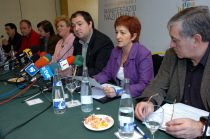
Begoña Errazti (EA), Pernando Barrena (Batasuna), Jose Elorrieta (ELA), Rafa Diez (LAB), Ainhoa Beola (Aralar), Mertxe Colina (AB), Anjel Abalde (ESK), Unzalu Salterain (EHNE), Panpi Sainte-Marie (ELB), Belen Arrondo (EILAS), Modesto Garcia (Hiru), Kepa Bereziartua (ANV) and Joxe Iriarte «Bikila» (Zutik)held a press conference to call a national demonstration on the 1st of April in Bilbao with the slogan "It's resolution time. Basque Country. Decision. Agreement."
They highlighted the importance of the popular support for a conflict resolution process in the Basque Country. In their opinion the Basque people must lead such a process. It's not a coincidence the amount of mobilisations in all around the Basque Country in the last weeks.
Through this demonstration and others they want to give a firm answer to the last couple of weeks' attacks like the two political prisoners killings, police repression in the streets and incarceration of Batasuna leaders.
16 March 2006
NEW SPANISH ATTACK

Petrikorena (Batasuna) and Olano (Askatasuna) were put in prison, Barrena (Batasuna's spokeman) and Diez (LAB union's general secretary) were released on 200.000 € and 100.000 € bail last week and Otegi (Batasuna's spokeman) and Alvarez (Batasuna's International Department Officer) will have to appear in court next week after the Spanish Special Court's decision.
This attacks have been largely denounced as a provocation and an obstacle to a conflict resolution conflict in the Basque Country by numerous Basque political parties and unions. In Ireland Gerry Adams (Sinn Féin) opposed measures and supported the Left Abertzale's efforts.
13 March 2006
THOUSANDS PROTESTED AGAINST DISPERSAL POLICY
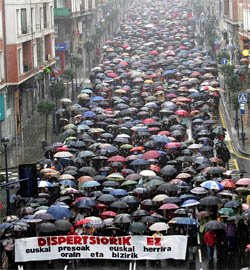
Thousands took the streets of Portugalete and Santurtzi last Saturday to protest against the criminal dispersal policy which keeps 700 Basque political prisoners spread all around Spain and France and kills prisoners and relatives.
Under heavy rain people marched to show their anger at last events and to make clear their determination to put forward a conflict resolution process despite all provocations from the Spanish and French states.
Igor Angulo's girlfriend, Idoia Muruaga, in a very strong and emotional speech at the end of the demonstration said: "Igor and Roberto's families suffered a lot during the last two weeks, as the Basque Country did. In these hard moments we have showed that they won't get what they want (speaking about Spanish and French governments)because what move us are dignity, love and happiness."
PROTEST IN BELFAST
Around forty people gathered last Saturday afternoon to show solidarity with the Basque political prisoners outside Cultúrlann in the Falls Road of Belfast.
The Belfast Basque Committee called the picket line after the last dramatic events in the Basque Country. Two political prisoners were found dead, their funerals and protests were savagely attacked by the police and leaders of the left-wing pro-independence movement face prison this week.
Different political parties and socialorganizationss launched today a petition denouncing this attack against the Left Abertzale defining it as a bid to undermine theopportunitiess to open a conflict resolution process.
Sinn Féin President Gerry Adams MP has voiced his concern at reports from the Basque Country that the courts are about to arrest key members of the Batasuna leadership. He called for the threats to be lifted and for the Spanish government to work with others to build a genuine peace process.
Mr. Adams said:
"The continuation of the ban on Basque political party Batasuna and jailing of its leadership will only serve to undermine efforts to establish a peace process.
"The Spanish government needs to end its policy of criminalization. Threats to arrest key members of the Batasuna leadership should be lifted immediately and the harassment of political prisoners should end.
"It is Sinn Féin's view that a real opportunity exists to make progress. I would call on the Spanish government to stop creating obstacles to progress and to work with others to create the conditions for inclusive dialogue."
The Belfast Basque Committee called the picket line after the last dramatic events in the Basque Country. Two political prisoners were found dead, their funerals and protests were savagely attacked by the police and leaders of the left-wing pro-independence movement face prison this week.
Different political parties and socialorganizationss launched today a petition denouncing this attack against the Left Abertzale defining it as a bid to undermine theopportunitiess to open a conflict resolution process.
Sinn Féin President Gerry Adams MP has voiced his concern at reports from the Basque Country that the courts are about to arrest key members of the Batasuna leadership. He called for the threats to be lifted and for the Spanish government to work with others to build a genuine peace process.
Mr. Adams said:
"The continuation of the ban on Basque political party Batasuna and jailing of its leadership will only serve to undermine efforts to establish a peace process.
"The Spanish government needs to end its policy of criminalization. Threats to arrest key members of the Batasuna leadership should be lifted immediately and the harassment of political prisoners should end.
"It is Sinn Féin's view that a real opportunity exists to make progress. I would call on the Spanish government to stop creating obstacles to progress and to work with others to create the conditions for inclusive dialogue."
10 March 2006
THOUSANDS OF BASQUES TOOK PART IN THE ACTION AND STRIKE DAY
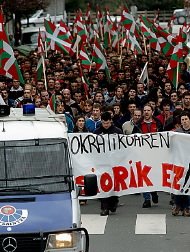
Thousands of people took part in hundreds of protests all along the Basque Country yesterday. The Left Abertzale called an action and strike day in protest for the two Basque Political Prisoners killed last week in Spanish gaols. Political status, repatriation and democratic resolution to the conflic were the main reasons which brought these people to the streets. Lots of the protesters were attacked by the police.
The Spanish Special Court Prosecutor called Batasuna, Askatasuna and LAB spokemen to appear in court next week and is asking for their incarceration as organisers of yesterday's action day.
Four bombs were set by ETA in four different places along the border between the Basque Country and Spain.
9 March 2006
FEBRUARY'S ISLADA BULLETIN LAUNCHED
Islada is Behatokia's monthly bulletin. Behatokia is the Basque Observatory of Human Rights and was created four years ago with the support of different Basque human rights organizations such as Askatasuna, Gurasoak, Etxerat and TAT. You can subscribe to it or just check it straight away in:
http://www.behatokia.info/boletin.php
http://www.behatokia.info/boletin.php
8 March 2006
BELFAST BASQUE COMMITTEE CALL PROTEST
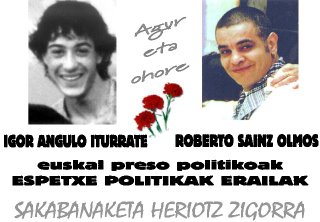
REPATRIATION AND POLITICAL STATUS FOR BASQUE POLITICAL PRISONERS AND SELF-DETERMINATION RIGHT FOR THE BASQUE COUNTRY!!
Last week two Basque Political Prisoners were killed by Spanish criminal prison policy and they are already four in the last 20 months.
Igor Angulo (Bilbao, 1973) was found dead in his cell in the Spanish prison of Cuenca (400 miles away from the Basque Country) where he was the only Basque Political Prisoner in the early hours of Sunday the 28th of February. Although the official version said he was hanging from his cell window and that he committed suicide neither his family nor the Basque people believe it. The forensic said he was laying on the bed (first contadiction) and his hands were tied by leather shoe laces (forbidden by the prison authorities). His girlfriend was speaking with him through the phone just few hours before his death and they were making plans for the future. He had no reason to committ suicide. The post mortem doesn’t provide any proof of suicide.
Roberto Sainz (Bilbao, 1965) felt bad during the morning of Friday the 3rd of March while holding a protest for Political Status in the Spanish prison of Aranjuez (300 miles from the Basque Country). Later on his comrades were told he died from a heart attack at the prison hospital. His lawyers and family denounced medical mistreatment as he didn’t get apropiate help.
Their funerals and popular protests were brutally attacked by the police.
More than 700 Basque Political Prisoners are hostages in more than 80 Spanish and French gaols hundreds of miles away from home. 12 prisoners were killed in the last 20 years and more than 20 relatives were killed in their way to visit them.
Despite the fact that ETA have not killed anybody as a result of their campaign in the last three years, 12 Basque political activists have lost their lives at the hands of the states.
All of this along with the political trial against 60 cultural, political, social and union pro-independence activists going on in the Special Spanish Court, torture, arrests, extraditions, new life sentences for political prisoners, banning of political and popular organizations, denying of civil and political rights render the situation in the Basque Country a powder keg and don't help at all the efforts that are being done by the left wing pro-independence movement and other nationalist and progressive forces to develop a process of democratic resolution of the conflict.
The Basque people need more than ever our support in this historical moment. Therefore the Belfast Basque Committee is calling a protest on SATURDAY 11TH 1PM CULTÚRLANN, FALLS ROAD, BELFAST.
Join the protests!! Support Basque Political Prisoners!! For a political resolution of the Basque-Spanish-French conflict!!
basquebelfast@hotmail.com
7 March 2006
WHEN LOVE DEFEATS SADNESS
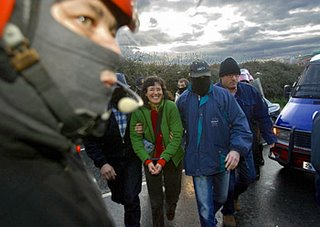
Banners where "ANA, we love you" could be read at the entrance of Portugalete welcomed Roberto Sainz's girlfriend. Roberto, Basque political prisoner died last Friday while holding a protest in the Spanish jail of Aranjuez. He allegedly died from a heart attack and his lawyers, family and Left Abertzale movement denounced he didn't have appropiated medical attention.
Ana, his girlfriend, was arrested along with him in 2003 and is a Basque political prisoners in the madrilian prison of Soto. As showed in the picture she was brought from jail to Portugalete for thirty minutes to say good bye to his boyfriend. They shared almost twenty five years together until they were arrested in 2003.
Despite the hard situation (she had to be given pills when she was told the bad news) she smiled to the hundreds of people who gathered to help her in these sad moments. Police tried to avoid all solidarity shows but once again people confront them.
LEFT ABERTZALE CALLS STRIKE AND PROTESTS
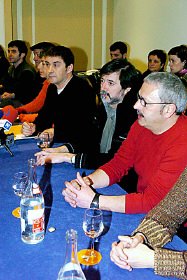
Three clear pictures taken during the tense last weekend can summarize the current political situation said Arnaldo Otegi in a Left wing pro-independence press conference yesterday.
In the first one he accused the Spanish state of trying to annihilate Basque political prisoners and pointed at the last two prisoners killings and the recent Spanish Supreme Court's decision on giving life sentences to Basque prisoners. He said that this is not the way to start a conflict resolution process.
In the second picture PNV (Basque Nationalist Party, right wing autonomist) is reflected when through their police brutally attacked funerals and protests. They are afraid of resolution and change Otegi said. They are trying to protect their business and status quo.
In the third picture is the Left Abertzale who showed his compromise with democratic resolution of the conflict but at the same time confronted firmly last week's attacks. Otegi said: "Nobody is going to stop us from paying tribute and giving a decent farewell to our prisoners. We love them and we won't leave them alone. Their are fighters for peace and freedom and our comrades in the struggle for independence and socialism."
To face this hard situation the Left Abertzale is going to keep firmly their positions pushing the democratic conflict resolution process and answering to all attacks strongly and with dignity.
Otegi pointed that it's not true that there weren't deaths in the last three years. It's the Left Abertzale who is paying the price of the brutal states repression with more than 10 activists killed in this period.
Then he called the Basque people to mobilize against the dispersal policy and in favor of the process on this Thursday's strike and protest day.
5 March 2006
DESPITE BRUTAL POLICE ATTACK THOUSANDS GATHERED
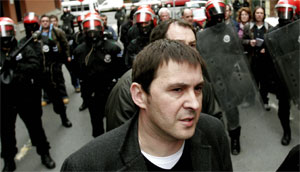
Thousands gathered yesterday in Santurtzi and Portugalete to say good bye to Igor Angulo and Roberto Saiz, Basque political prisoners killed this week in Spanish jails. Both towns are just a few miles one from the other.
Hundreds of autonomous Basque police closed all routes to these towns in an attempt to stop thousands of people to gather and pay tribute to Igor and Roberto. The police charged brutally against the crowd and dozens were brought to hospitals.
Witnesses pointed that those scenes were even worst than the Franco's times. Batasuna asked the Basque Home Affairs minister to resign.
3 March 2006
GENERAL STRIKE IN SANTURTZI IN PROTEST FOR IGOR'S KILLING
Almost all shops and bars are closed in Santurtzi today after a general strike was called in protest for their local Basque political prisoner Igor Angulo. More protests are to be hold during the day in all Basque Country. They are supported by majority of trade unions, social organizations and left wing pro-independence movement.
In a busy press conference and helped by more than fifty political prisoners relatives Igor Angulo's girlfriend made clear that "he is been murdered and nobody can have any kind of doubt". She said that even the jails' director was shocked and highlighted how despite political differences he had a good opinion about Igor and added that he was an important prisoner as he helped everybody (he got the nickname "Little Lawyer").
The forensics pointed that there are still strong reasons and contradictions to keep doubts on the circumstances of Igor's death.
In a busy press conference and helped by more than fifty political prisoners relatives Igor Angulo's girlfriend made clear that "he is been murdered and nobody can have any kind of doubt". She said that even the jails' director was shocked and highlighted how despite political differences he had a good opinion about Igor and added that he was an important prisoner as he helped everybody (he got the nickname "Little Lawyer").
The forensics pointed that there are still strong reasons and contradictions to keep doubts on the circumstances of Igor's death.
BASQUE PRISONER ROBERTO SAIZ DIED TODAY

This is the second Basque political prisoner to die in the last five days.
Roberto Saiz (Bilbao, 1965) was holding a protest along with other political prisoners in Aranjuez prison (Madrid) when he felt bad and lost his consciousness. Later on he died from a heart attack as jailers told his comrades.
He was arrested in 2003 and denounced tortures while he was incommunicado on hands of the Basque peelers. At that time he was a LAB (pro-independence left trade union)representative.
2 March 2006
EMOTIONAL WELCOME TO IGOR IN SANTURTZI
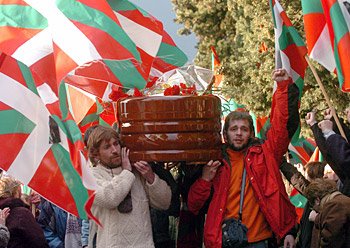
Despite the Basque Home Affairs' minister's prohibition (PNV government)one thousand people welcomed Igor Angulo Basque political prisoner's coffin in his town Santurtzi.
Santurtzi's usual landscape was transformed with thousands of raised fists, red carnations and Basque flags with black ribbons painting an emotional and tense picture. In fact nobody knew how the particular Basque peelers were going to react.
Sad faces, tears and "Igor, fighter, we remember you" and "The people won't forgive" shouts flooded the way from the town centre to the cemetery.
Then a humble political meeting took place and Juan Mari Olano, Askatasuna's spokeman, expressed the people's concerns by saying that "nobody proved that he committed suicide. He is been probably strangled." He also added that "the dispersal policy killed him" and pointed to the Spanish government and PNV (Basque Nationalist Party who helped in the design of such policy in the lates 80's)as responsibles for this. He accused the PNV of "sending the prisoners from the prison hole to the cemetery hole" as they didn't allow any kind of homage for Igor.
However tomorrow is been called a general strike in Santurtzi and a national homage on Saturday.
Subscribe to:
Comments (Atom)


